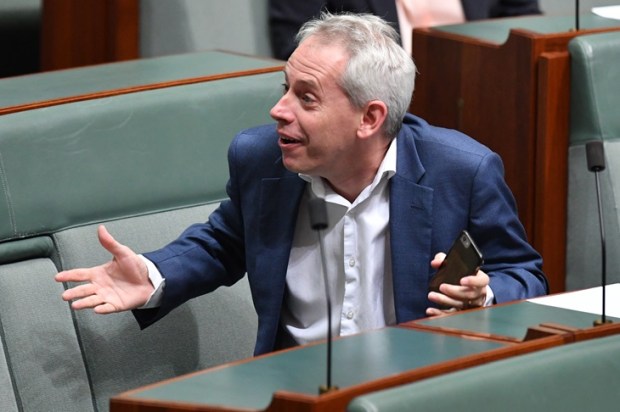‘Chase too many rabbits, you’ll catch none,’ as the old saying goes. The right in Australia will soon be putting this theory to the test as they contend two major battles this year: the Voice referendum, and record immigration intake. They may win one battle, but will it matter if it means losing the other?
As of writing, ‘No’ is sitting at 53 per cent and ‘Yes’ is sitting at 38 per cent. Andrew Clennell from Sky News Australia has declared the Voice referendum officially done. ‘It’s over,’ he said.
If ‘No’ wins, it will be a stunning victory. But it may be a victory in the wrong battle.
Conservatives are failing miserably on immigration. In fact, they’re not even fighting. Despite a few quiet protests from Liberal members or One Nation, Labor has lifted immigration to its highest levels ever. They’ve signed a record-breaking migration deal with India, and ramped up international student intake to such a degree that 1 in 30 people in Australia right now are international students.
Any champagne sipped by the ‘No’ side on October 14 will have the bittersweet taste of winning a small battle in a losing culture war. The sad reality is that conservative fears over the Voice – that is to say the reshaping of our society, the overhauling of our economy, the manipulation of our democracy, and the rapid change to our way of life – is already well underway. The right, weak with poor leadership, has been outgunned and outflanked.
While the Voice threatens to change the Constitution, immigration has already changed the country. For 20 years, Australia has led one of the largest migration programs in the world, with a record 456,000 migrants arriving in Australia in the last financial year alone. Nearly 650,000 are predicted by next year, and the Intergenerational Report projects that Australia will add another 14.2 million migrants by 2062.
The statistics are stunning. Nearly 30 per cent of Australia’s population is now foreign-born, while Greater Sydney and Melbourne now boast a foreign-born population of around 45 per cent. According to data conducted by NSW Parliament, some electorates of Sydney saw a 79 per cent change in their foreign-born population in the last four years, with some suburbs, including the electorate of Sydney, well on their way towards being majority foreigners. Former Prime Minister Malcolm Turnbull has previously boasted that Australia is ‘the world’s most successful multicultural country’, yet one wonders how long that will last. A recent spate of violent inter-ethnic attacks, robberies, and killings threatens this harmony.
Moreover, ‘White flight’ is a touchy term that many would call a dog whistle, but as data found in 2018 by The Australian found, the truth is that it’s a statistical reality. In 2016, suburbs in Western Sydney witnessed a mass exodus of locals – typically Anglo-Saxon Australians – while at the same time receiving massive inflows of migrant arrivals. This means that with immigration ramped up to record highs, we might now see the same happen not just in other Sydney suburbs, but in Sydney itself. Note that last year 121,000 New South Welshmen left the state, with most moving to Queensland.
Witnessing the dramatic change of the neighbourhood you grew up in is now a common story for many Australians, old and young. The once-homogenous area my father grew up in is now over 60 per cent foreign-born, with above-average crime rates and poverty. In London, a BBC documentary, The Last Whites of East End, captures this phenomenon, and the heartbreak that entails. ‘I feel a foreigner in my own borough. We were born here. Lived here. Finding ourselves marginalised out,’ said one East Ender. ‘I feel like it [East End] is just going to dwindle out,’ said another.
Many will argue that having a majority foreign-born population is not necessarily a bad thing. But nobody to date has bothered to argue why exactly it’s a good thing either. The question of ‘how does this policy outcome benefit Australians?’ was never really answered. It kind of just happened, without a single word of discussion – as if it were an act of nature, and not a direct result of, government policy. The only words ever spoken about the matter are those from people like Immigration Minister Andrew Giles, who kept repeating the same old mantra of our times, that ‘diversity is our greatest strength’.
Entire suburbs and cities of Australia have now had their composition radically changed. Yet it is deeply unfashionable to discuss such changes – unless, of course, you’re promoting it. ‘A great strength for Australian society…’ Multicultural leaders praise nation’s growing diversity’ headlines a recent publicly-funded SBS article.
And it isn’t just the social changes from immigration putting pressure on Australia, it’s the economy too.
Merited concerns have been raised in the Voice debate about ‘paying the rent’, yet while this debate continues, actual rents rose a massive 24 per cent, driven mostly by overseas immigration. Fears over ensuing land grabs have made for arresting headlines, but they lose some of their sting when one realises just how much land will be needed to house 14.2 million new migrants. If you’re worried about land grabs, you should be worried about immigration.
Not only has mass immigration made the country poorer per capita – as many have argued – it’s fundamentally re-engineered our economy, shifting direction away from innovation and entrepreneurship, towards inflating unproductive assets. As one person on Twitter noted, 1.5 per cent of the entire world’s GDP is now stored in the Australian housing market. Not exactly the sign of a smart, healthy economy.
Much lip service is paid to Australia’s skilled migration program. The thinking is that despite Australia having world-class universities and training facilities, we’re somehow unable to train our people to do the skilled work. And we are told that these skilled migrants create jobs and boost the economy. Unfortunately, the problem with that is that 72 per cent of our migrants aren’t selected based on skills, and far from adding to our economy, this group is costing taxpayers $13.6B every single year. Yes, migrants benefit the bottom line by artificially inflating GDP, the problem is that those benefits get hoovered up by businesses, who are now posting record profits, while the taxpayer is stuck with fewer jobs, less housing, and also a multi-billion dollar bill.
Then there’s the other major conservative complaint against the Voice – that it will capture our democracy and shift it further leftwards. Yet again, win or lose, it won’t matter – because this is already happening thanks to migrant voting habits. This isn’t a conspiracy theory – it’s a strategy. To understand how and why they’re doing it, you simply need to listen to the people who promote it.
‘When these [immigrants] enrol to vote, 20 per cent more of them will vote Labor,’ boasted a Labor-aligned consultant, showing a chart of Labor’s exploding migrant arrival numbers.
Labor’s numbers stack up. According to research done by the Carnegie Endowment for International Peace, newly arrived migrants are more than twice as likely to vote Labor as they are the Coalition (45 to 23 per cent). Their plan so far is working. In NSW, out of the top areas for foreign-born population, 16 out of 20 voted Labor. The Coalition, blindly supportive of mass immigration, are walking themselves into a political death trap. As one former Liberal Party strategist told me, Labor is now shaping up to ‘be in power for the next 50 years’.
Matthew Goodwin details in his fantastic book, National Populism: The Revolt Against Liberal Democracy, how mass immigration and the subsequent rapid demographic change and economic decline led to a fundamental shifting of the national mood.
‘Politics today feels more chaotic and less predictable than in the past because it is. Large numbers of people feel that they no longer have a voice in politics. That rising immigration, and rapid ethnic change threaten their national group, culture and ways of life. That the neoliberal economic system is leaving them behind relative to others in society, and who no longer identify with established politicians.’
This, he argues, has created a ‘pool of potential’ for national populist leaders to emerge.
To see what he means, look to Germany. There the immigration restrictionist party Alternative for Deutschland is currently polling at 21 per cent, putting them in second place. The now-governing right-wing national populist Sweden Democrats put their electoral success down to arguing against decades of neo-liberal economics which they say weakened their strength as a nation, and what they say is a declining ‘Swedishness’ brought on by mass immigration. Meanwhile, PHON, constantly embroiled in in-fighting, has struggled to strike a chord larger than a few sitting Senators. For Australia to successfully ride a way of National Populist sentiment, it will need professionalisation, away from personality politics. Whether this comes from a new Liberal party, a new PHON, or something else entirely, is yet to be seen.
While 53 per cent say they’ll be voting No, 70 per cent of Australians say they want lower immigration. The popular mandate is there, but where is the campaign? Where are the millions of dollars in donations? Where are the strategists, the headlines, the constant news stories? As I’ve laid out in this article, the arguments against both the Voice and mass immigration are almost exactly the same, yet a campaign against immigration has yet to materialise.
If the conservative establishment are unwilling to face the issue of immigration, including its cultural, social and economic impacts, people will start looking for an alternative for Australia.
Jordan Knight is the founder of Migration Watch Australia

























